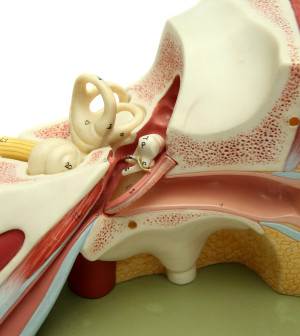- Recognizing the Signs of Hypothyroidism
- 10 Strategies to Overcome Insomnia
- Could Artificial Sweeteners Be Aging the Brain Faster?
- Techniques for Soothing Your Nervous System
- Does the Water in Your House Smell Funny? Here’s Why
- Can a Daily Dose of Apple Cider Vinegar Actually Aid Weight Loss?
- 6 Health Beverages That Can Actually Spike Your Blood Sugar
- Treatment Options for Social Anxiety Disorder
- Understanding the Connection Between Anxiety and Depression
- How Daily Prunes Can Influence Cholesterol and Inflammation
FDA OKs Drug to Treat Hot Flashes in Menopausal Women


FRIDAY, Oct. 4Pfizer Inc. says it has gained U.S. approval for a drug designed to treat menopause-related hot flashes and potentially prevent osteoporosis in postmenopausal women who have a uterus.
The United States is the first country to approve the once-a-day tablet called Duavee (conjugated estrogens/bazedoxifene), according to Pfizer. When prescribed just for the prevention of osteoporosis in postmenopausal women, use of Duavee should only be considered for women at significant risk, and non-estrogen medication should be considered first, the drug maker advised.
The U.S. Food and Drug Administration’s approval was based on phase 3 clinical trials that included generally healthy, postmenopausal women with a uterus. One study found that women taking the drug had 74 percent fewer moderate-to-severe hot flashes after 12 weeks of treatment, compared with a 47 percent reduction among women who took a placebo, Pfizer said in a news release.
In other trials, women who took Duavee showed increased levels of bone mineral density in the hip and lumbar spine after one and two years of treatment, while women in the placebo group had decreased levels, the drug company said.
Common side effects of Duavee include muscle spasms, nausea, diarrhea, upset stomach, abdominal pain, throat pain, dizziness and neck pain, according to Pfizer.
Pfizer said that Duavee should not be used by women who: have or have had blood clots; are allergic to any of its ingredients; have unusual vaginal bleeding; have or have had certain cancers (e.g. uterine or breast), liver problems, or bleeding disorders; or are pregnant, may become pregnant or are breast-feeding.
Estrogen and drugs like bazedoxifene can increase the risk of blood clots. Women should talk with their doctor about how long to stay on Duavee, Pfizer said.
One expert said women should weigh their options carefully before choosing to take the drug.
“Duavee should be used with caution, and only for the shortest time possible,” said Dr. Jennifer Wu, an ob/gyn with Lenox Hill Hospital in New York City. “No hormone replacement is intended for the long term.”
“Uterine cancer may still be a risk when using the estrogen,” Wu added. “Longer term studies are needed.”
More information
The U.S. Office on Women’s Health has more about menopause.
Source: HealthDay
Copyright © 2026 HealthDay. All rights reserved.










